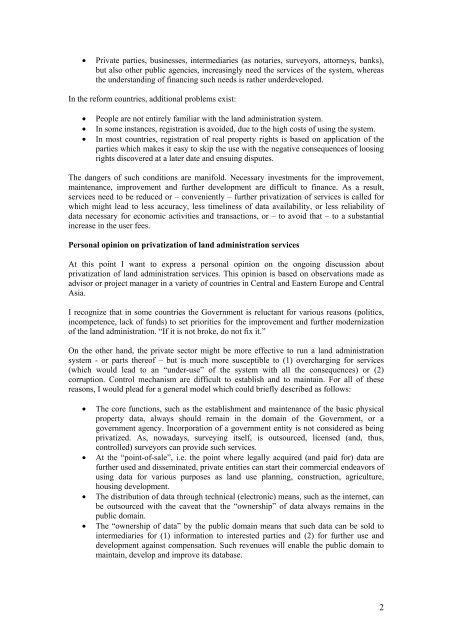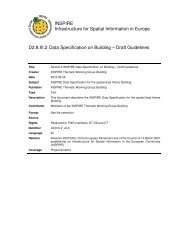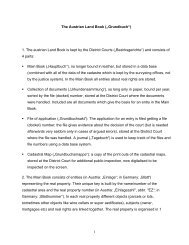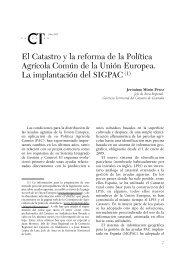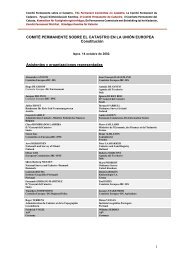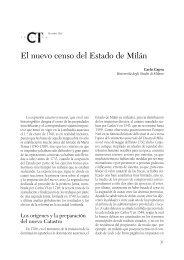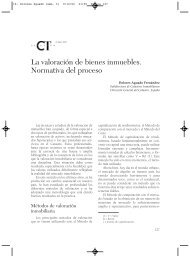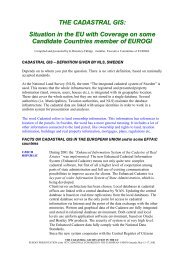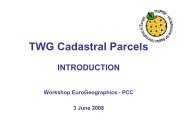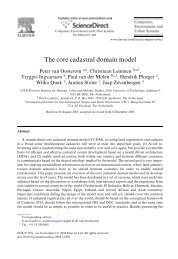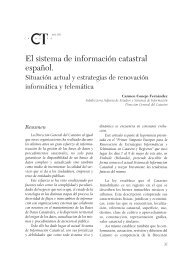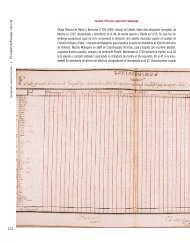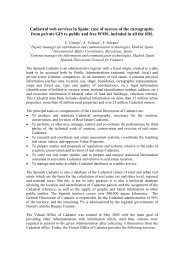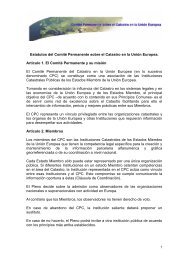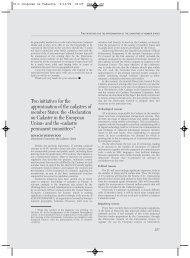IS SOCIETY AWARE OF THE LAND
IS SOCIETY AWARE OF THE LAND
IS SOCIETY AWARE OF THE LAND
You also want an ePaper? Increase the reach of your titles
YUMPU automatically turns print PDFs into web optimized ePapers that Google loves.
• Private parties, businesses, intermediaries (as notaries, surveyors, attorneys, banks),<br />
but also other public agencies, increasingly need the services of the system, whereas<br />
the understanding of financing such needs is rather underdeveloped.<br />
In the reform countries, additional problems exist:<br />
• People are not entirely familiar with the land administration system.<br />
• In some instances, registration is avoided, due to the high costs of using the system.<br />
• In most countries, registration of real property rights is based on application of the<br />
parties which makes it easy to skip the use with the negative consequences of loosing<br />
rights discovered at a later date and ensuing disputes.<br />
The dangers of such conditions are manifold. Necessary investments for the improvement,<br />
maintenance, improvement and further development are difficult to finance. As a result,<br />
services need to be reduced or – conveniently – further privatization of services is called for<br />
which might lead to less accuracy, less timeliness of data availability, or less reliability of<br />
data necessary for economic activities and transactions, or – to avoid that – to a substantial<br />
increase in the user fees.<br />
Personal opinion on privatization of land administration services<br />
At this point I want to express a personal opinion on the ongoing discussion about<br />
privatization of land administration services. This opinion is based on observations made as<br />
advisor or project manager in a variety of countries in Central and Eastern Europe and Central<br />
Asia.<br />
I recognize that in some countries the Government is reluctant for various reasons (politics,<br />
incompetence, lack of funds) to set priorities for the improvement and further modernization<br />
of the land administration. “If it is not broke, do not fix it.”<br />
On the other hand, the private sector might be more effective to run a land administration<br />
system - or parts thereof – but is much more susceptible to (1) overcharging for services<br />
(which would lead to an “under-use” of the system with all the consequences) or (2)<br />
corruption. Control mechanism are difficult to establish and to maintain. For all of these<br />
reasons, I would plead for a general model which could briefly described as follows:<br />
• The core functions, such as the establishment and maintenance of the basic physical<br />
property data, always should remain in the domain of the Government, or a<br />
government agency. Incorporation of a government entity is not considered as being<br />
privatized. As, nowadays, surveying itself, is outsourced, licensed (and, thus,<br />
controlled) surveyors can provide such services.<br />
• At the “point-of-sale”, i.e. the point where legally acquired (and paid for) data are<br />
further used and disseminated, private entities can start their commercial endeavors of<br />
using data for various purposes as land use planning, construction, agriculture,<br />
housing development.<br />
• The distribution of data through technical (electronic) means, such as the internet, can<br />
be outsourced with the caveat that the “ownership” of data always remains in the<br />
public domain.<br />
• The “ownership of data” by the public domain means that such data can be sold to<br />
intermediaries for (1) information to interested parties and (2) for further use and<br />
development against compensation. Such revenues will enable the public domain to<br />
maintain, develop and improve its database.<br />
2


